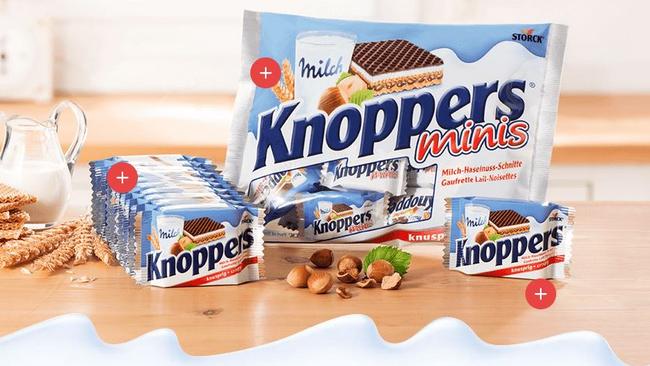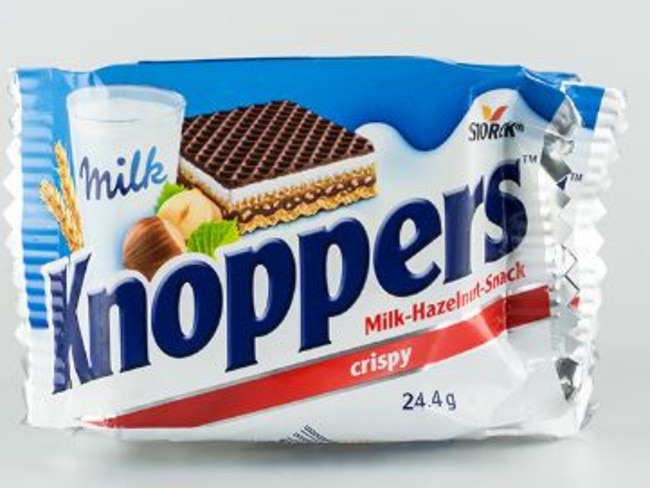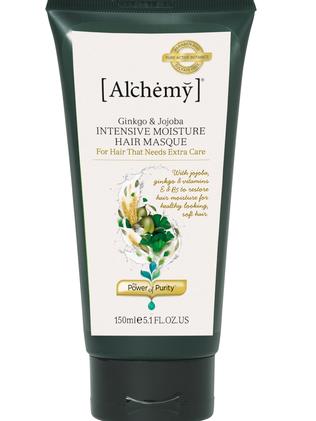The obscure Aldi product Chinese shoppers are going crazy for
THESE German treats sold at Aldi stores are among the most in-demand in Australia right now. Chinese shoppers can’t get enough of them.

JUST a few months ago in an Aldi store somewhere in Australia, a couple of savvy shoppers came across a box of biscuits and an opportunity.
The chocolate-topped, milk- and hazelnut-flavoured, wafer-based treats were Knoppers, a German confectionary product only available in a few countries and known for its natural ingredients.
And the shoppers were daigous, the increasingly influential brand of online marketers making millions promoting and shipping Australian store-bought products to their Chinese connections.
The influence of the Chinese social media-based retailers has been visibly growing in Australia.
Their race to sell trusted Australian-made baby formula led to a national shortage and, capitalising on a Weet-Bix product placement in a Chinese soap opera, the shoppers collectively stripped supermarket shelves of the Aussie breakfast staple.
Now Australia-based daigous have expanded from their initial range of baby formula and vitamins and are wielding their influence on stockists and buyers of food products, cosmetics and a range of nutrition and lifestyle products.
HOW A PRODUCT STARTS TO BOOM
The range is now so broad it’s hard to tell what the next product to be plucked from shelves and launched into an insane spiral of daigou-fuelled demand will be.
Livia Wang, Chinese marketing expert and director of consulting company Access China, told news.com.au sometimes the reason for something catching on can be as simple as a good old-fashioned bargain — as was the case with the little-known Aldi biscuit brand.

“The reason they (daigous) started buying them was because they were a good price,” she said.
“There are several different angles that a trend can start from, but with something like this it is that several daigou see that it is sold at a discount, they think that’s a good price, let’s buy say, 100 units, and start selling it. Other daigous will start thinking this must be very popular so I’ll start selling it too. Of course the end consumer has to love it too.”
Ms Wang explained that when it came to Knoppers, the product already had a reasonable profile in China and had been in high demand from German daigous, but savvy Australian resellers discovered it was more affordable to buy here and ship back to China than it was for their German counterparts.
“When this was first realised, all of a sudden daigous got a lot of orders,” she said.
“The demand generated from China a little bit, but then the daigous started to promote very heavily. Chinese people start knowing more that it is available here and so it’s become very popular for tourists to bring back as a gift.”
Through her company’s own daigou channel, Ms Wang said she has seen as many as 1000 orders for boxes of Knoppers in one day.
“It has only been like this for the past three or four months,” she said.
Aldi is yet to respond to news.com.au’s questions over the impact it has had on sales.
WHAT'S HOT AND WHAT’S NOT
Other products that have recently shot up in popularity on the daigou market in the past few months include shampoo and conditioner by “natural skincare” brand A’kin.


NSW food supplier the Market Grocer, which supplies independent and specialty grocers with its “quality authentic and value-driven products”, has been boosted by daigous who have been selling large volumes of its dried cranberries.
Australian daigous have also seen a big boost in demand for Kotex feminine hygiene products and Sydney-based nutritional supplements brand Bio Island.
As of June this year, Weet-Bix has been a hot product for daigous, and supplement companies Blackmores and Swisse, along with baby formula brands Aptamil and A2, remain the constant top sellers.
Ms Wang said it is unusual these days for a product to skyrocket to the top of daigous’ most wanted lists organically, since Australian brands are beginning to cotton on to the influence daigous have on the previously untapped market of Chinese consumers.
Brands are desperate to get their products noticed by daigous and have them pushed on their social media networks, and are lining up to engage consultants like Ms Wang to do so.
BRANDS BEING LEFT BEHIND
At a recent retail industry event in Sydney, Alibaba executive John O’Loghlen said businesses needed to embrace daigous.
“Every client we talk to, if they’ve been to China and they understand China, they know the importance of the daigou community,” he said.
“There are very big (fast-moving consumer goods) companies that have not gone into China. They haven’t been involved with the opening of their Tao Bao store. They’ve stood back and let the daigou community develop their products for them, and that’s worked in some cases.”
It’s a massive shift from the attitudes Australian consumers and brands held towards the Chinese resellers as recently as a year ago when their practices began to be publicised at the peak of the baby formula shortage scandal.
But those who try to outsmart the daigous and bypass their sales channels are being punished.
While baby formula remains among the most in-demand products daigous are selling back to China, one Australian brand has suffered.

Organic baby formula brand Bellamy’s has had to halt trading after a disastrous run of sales that saw its share price plummet, and daigous are taking some responsibility.
A former daigou, which abandoned the trade after China brought in restrictive shipping regulations earlier this year, told news.com.au hardly any daigou he knew were still selling Bellamy’s.
“They want to bypass daigou by directly selling to China, that was fine, but they were selling their formula in China with prices even cheaper than the ones selling Coles and Woolies,” he said.
“Daigou simply had no ways to make a profit for selling Bellamy’s like before. They forgot it was daigous first introducing and promoting their brand to Chinese buyers ... I think the Bellamy’s fairytale is over.”
Other daigous have told news.com.au the company appeared to have “underestimated the influence and power of daigous” and was suffering.
Ms Wang believes in this case, the daigou influence has been over-estimated and the company’s slump cannot be attributed only to daigous.




